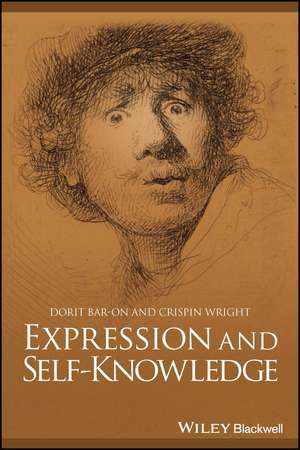Expression and Self–Knowledge: Great Debates in Philosophy
Autor D Bar–Onen Limba Engleză Paperback – 11 oct 2023
Preț: 234.20 lei
Nou
Puncte Express: 351
Preț estimativ în valută:
44.82€ • 46.51$ • 37.46£
44.82€ • 46.51$ • 37.46£
Carte tipărită la comandă
Livrare economică 17-31 martie
Preluare comenzi: 021 569.72.76
Specificații
ISBN-13: 9781118908471
ISBN-10: 1118908473
Pagini: 368
Dimensiuni: 152 x 229 x 20 mm
Greutate: 0.49 kg
Editura: Wiley
Seria Great Debates in Philosophy
Locul publicării:Chichester, United Kingdom
ISBN-10: 1118908473
Pagini: 368
Dimensiuni: 152 x 229 x 20 mm
Greutate: 0.49 kg
Editura: Wiley
Seria Great Debates in Philosophy
Locul publicării:Chichester, United Kingdom
Notă biografică
Cuprins
Preface and Acknowledgments ix 1 Privileged Access 1 Dorit Bar-On and Crispin Wright §1.1 Privileged Access: What Is the Problem? 1 §1.2 The Cartesian "Solution" 3 §1.3 Language First or Thought First? 7 2 Skepticism about the Problem 11 Crispin Wright §2.1 Rejecting the Entire Explanatory Project: Wittgenstein and the "Default View" 12 §2.2 Disputing the "Data" 18 §2.2.1 Snowdon 18 §2.2.2 Schwitzgebel 25 §2.2.3 Carruthers 31 §2.2.4 Williamson 39 3 A Critique of Some Recent Accounts of First-Person Privilege: Part I: Epistemic Approaches 43 Dorit Bar-On and Crispin Wright §3.1 Epistemic Approaches 44 §3.2 Epistemic Access as "Inward Gaze": Non-Cartesian Conceptions of Inner Sense 45 §3.2.1 Materialist Introspectionism 45 §3.2.2 Against an Expertise Model of First-Person Privilege 48 §3.3 Privileged Access as Outer Gaze: Transparency Views 51 §3.3.1 Gareth Evans: Transparency as an Epistemic Procedure 51 §3.3.2 Five Limitations of Transparency as an Epistemic Procedure 53 §3.3.3 Alex Byrne: Transparent Inference Rules 58 §3.4 Christopher Peacocke on Self-Knowledge of Belief 64 4 A Critique of Some Recent Accounts of First-Person Privilege: Part II: "High-Road" Approaches to Self-Knowledge 73 Dorit Bar-On and Crispin Wright §4.1 Avowals as Expressive of Commitments: Moran and Bilgrami 74 §4.2 Against Commissive Views 78 §4.3 The Uniformity Constraint 82 §4.4 Tyler Burge on Self-Knowledge and Critical Reasoning 86 §4.5 Metaphysical Constitutivism: Resoluteness and Shoemaker 92 §4.6 Conceptual Constitutivism: Wright and Judgment-Dependence 96 §4.7 Privileged Access: Diagnosis and Desiderata 100 5 Some Initial Thoughts about Expressivist Responses to the Problem 103 Crispin Wright §5.1 Psychological Expressivism: Simple and Radical 103 §5.2 Radical Expressivism: Some Serious Misgivings 107 6 Neo-Expressivism: Speaking One's Mind 110 Dorit Bar-On §6.1 Avowals' Distinctive Security and Basic Self-Knowledge: A Brief Overview 111 §6.1.1 Basic Self-Knowledge: Some Theses, Some Questions 111 §6.1.2 "Language-first" Vs. "Thought-first" 113 §6.1.3 Avowals' Security: The Explanatory Task 115 §6.2 Expressivism: Simple, Radical, and New 116 §6.2.1 Simple Expressivism 117 §6.2.2 "Radical" Expressivism 120 §6.3 The Neo-Expressivist Account of Avowals' Distinctive Security 124 §6.3.1 Avowals: Acts, Products, Vehicles 124 §6.3.2 Neo-Expressivism: Explaining Avowals' Distinctive Security 128 §6.3.3 Avowals' Security: Immunity to Error 130 §6.3.4 Dual Immunity to Error and the Expressive Character of Avowals 137 §6.3.5 False Avowals, Transparency, and Moore's Paradox 139 7 Neo-Expressivism: Knowing One's Mind 144 Dorit Bar-On §7.1 Neo-Expressivism and Self-Knowledge 145 §7.2 Expression and No-"How" Basic Self-Knowledge 146 §7.2.1 "Baseless" Self-Knowledge: Warrant, Entitlement, and Grounding 147 §7.2.2 The Dual Immunity to Error of Avowals and Avowals' Default Entitlement 149 §7.2.3 Avowals as Warranted: Baseless yet Grounded? 151 §7.3 Basic Self-Knowledge Without Avowals? 154 §7.3.1 The Objection from Unavowed Self-Knowledge 155 §7.3.2 Implicit Self-Knowledge and the "Episodic Constraint" 156 §7.3.3 Is Avowing Necessary for Possessing Actual Self-Knowledge? 163 §7.4 Neo-Expressivism: "Grammar," Epistemology, and Metaphysics 169 §7.4.1 Neo-Expressivism Vs. Other Views 169 §7.4.2 Expression, Self-Knowledge, and the Nature of Mind 173 Appendix: Epistemological Disjunctivism about Self-Knowledge 178 8 On Neo-Expressivism: Continuing Doubts 183 Crispin Wright §8.1 Introduction: Testimony, Expression, and the Program for the Chapter 183 §8.2 Immunity to Error through Misidentification and Immunity to Error through Misascription 187 §8.3 Immediacy and the Phenomenal 193 §8.4 Is Self-Knowledge a Kind of Knowledge "No-'How'"? 197 §8.5 Bar-On's Marginalization of Salience 199 §8.6 "Speaking From" and Authority 202 §8.7 On Neo-Expressivism's Account of Self-Knowledge 211 §8.8 Neo-Expressivism and Barn Façades 218 §8.9 Resumé of Objections Raised 220 9 Speaking One's Mind: Authority, Testimony, and Expression 224 Dorit Bar-On §9.1 Introduction: Where Are We? 226 §9.2 Avowals' Immunity to Error, Security, and Authority 228 §9.3 Avowals: Testimony, and "Evidential Force" 234 §9.4 Arguments for the Routine Testimonial Model Debunked 237 §9.4.1 The Argument from Deliberate Expression 238 §9.4.2 The Argument from Intentional Communication 240 §9.4.3 The Argument from Linguistic Application 243 §9.5 "Evidential Force" and "Performance Equivalence" 247 §9.6 The Insufficiency of RTM 249 §9.7 Wright's Knowledge "How" and the Immediacy of the Phenomenal 253 §9.8 Avowals' Expressive Character and Speaking One's Mind 255 §9.9 What about Salience? 258 Appendix: On Immunities to Error and Skeptical Scenarios 263 §1 Expressive Character and Non-Recognitionality 263 §2 Non-Recognitionality and IEM/A 264 §3 Non-Recognitionality and Brute Error 265 §4 Mental State Façade Country? 266 10 Divide and Conquer: A Prospectus for Progress? 270 Crispin Wright §10.1 Some Points about Belief and Judgment 271 §10.2 Varieties of Awareness and of Judgment-Dependence 274 §10.3 Avowals as Initiative? 279 §10.4 Self-Interpreting 286 §10.5 Self-Knowledge of Intentionally Directed Affective States 287 §10.6 Common-sense Psychological Explanation and the Trifecta 292 §10.7 Summary of the Prospectus 295 11 Expression, Mediating Beliefs, and the Judgment-Independence of Mental States 298 Dorit Bar-On §11.1 Expression, Action, and Belief 299 §11.1.1 Wright's Argument from Intentional Action Debunked 301 §11.1.2 Expressive Acts and Intentional Actions 303 §11.2 "Initiative" Avowals 306 §11.3 (Non-Phenomenal) Attitudinal Avowals 310 §11.4 Avowals of "Pure Phenomenal" States and "Directed Affective" States: "S-awareness" and "C-awareness" 313 §11.4.1 Pure Phenomenal States ("PPSs"): Hypothesis 1 314 §11.4.2 Directed Affective States ("DASs"): Hypothesis 2 315 §11.4.3 Difficulties with Hypotheses 1 and 2 317 §11.5 Some Remaining Cases 322 §11.5.1 "Negative Avowals" 323 §11.5.2 Self-Ascriptions of Psychological Change 325 §11.6 Uniformity and the Trifecta 328 Bibliography 334 Index 344













